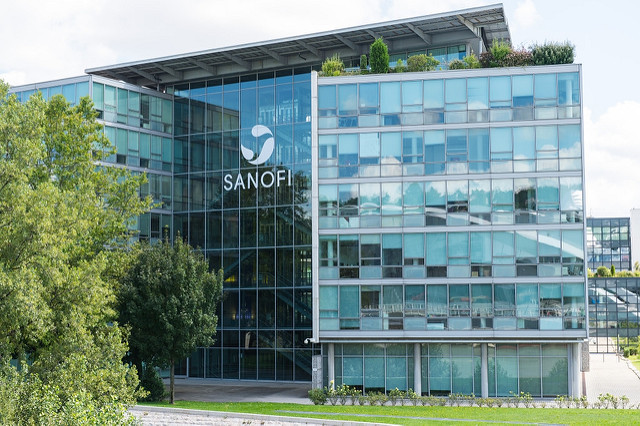
Sanofi and Regeneron Pharmaceuticals announced positive preliminary results with investigational REGN2810, a checkpoint inhibitor targeting PD-1 (programmed death 1), in patients with advanced cutaneous squamous cell carcinoma (CSCC). The data, pooled from two expansion cohorts of the REGN2810 Phase 1 trial, will be presented today at the 2017 American Society of Clinical Oncology (ASCO) Annual Meeting in Chicago during an oral presentation (Abstract #9503). REGN2810 is also being investigated in EMPOWER-CSCC 1, an ongoing Phase 2, potentially pivotal, single-arm, open label clinical trial that is currently enrolling advanced CSCC patients.
Treatment with REGN2810 led to an investigator-assessed overall response rate (ORR) of 46.2 percent (12 of 26 patients, including 2 complete responses, 9 partial responses and 1 unconfirmed partial response) and a disease control rate (DCR) of 69.2 percent (18 of 26 patients, including 12 ORR and 6 stable disease). The median progression free survival and overall survival were not reached at the data cutoff date with a median follow up of 6.9 months (range: 1.1 to 13.8 months; ongoing). One patient experienced progressive disease during treatment with REGN2810 after the initial response, and two patients were not evaluable due to death considered unrelated to REGN2810. Ten patients remain in response as of the data cutoff date (range 8 to 40 weeks duration of response).
The most common treatment-related adverse event of any grade was fatigue (23.1 percent). All grade 3 or higher adverse events occurred once and included arthralgia (3.8 percent), maculopapular rash (3.8 percent), asthenia (3.8 percent), aspartate aminotransferase (AST) elevation (3.8 percent) and alanine aminotransferase (ALT) elevation (3.8 percent).
“Cutaneous squamous cell carcinoma or CSCC is the second deadliest skin cancer after melanoma, according to the most recent data available,” said Kyriakos P. Papadopoulos, M.D., Senior Clinical Investigator at South Texas Accelerated Research Therapeutics (START) and the study presenter. “There are limited treatments and no established standards of care for advanced stages of this disease. CSCC has one of the highest mutation rates reported for any cancers, likely contributing to the study findings, which represent a high responder rate to a PD-1 antibody in a solid tumor cancer. These results are promising and suggest the PD-1 pathway is an important therapeutic target in these patients.”
No apparent association between the objective response and level of PD-L1 (programmed death ligand 1) expression was found. PD-L1 expression by immunohistochemistry (22C3 clone, Dako) was performed in tumor cells for 21 expansion cohort patients, with 81 percent of patients (17 of 21) having greater than or equal to 1 percent positive PD-L1 expression. Additional correlative studies are in process.
This Phase 1 study was designed with an initial dose-escalation portion followed by multiple expansion cohorts that were opened to investigate safety and antitumor activity in specific patient populations. These results are from 10 patients with distantly metastatic CSCC who were enrolled in one expansion cohort (Cohort 7) and 16 patients with inoperable (unresectable) locally or regionally advanced CSCC who were enrolled in a second expansion cohort (Cohort 8). All expansion cohort patients were treated with 3 mg/kg doses of REGN2810 by intravenous infusion over 30 minutes every two weeks for up to 48 weeks.
REGN2810 is a human, monoclonal antibody targeting the checkpoint inhibitor PD-1 and is being jointly developed by Regeneron and Sanofi under a global collaboration agreement. REGN2810 is currently being explored as a monotherapy for multiple cancers – including cutaneous squamous cell carcinoma (CSCC), basal cell carcinoma (BCC) and non-small cell lung cancer (NSCLC) – as well as in combination with REGN3767, another investigational immunotherapy targeting the checkpoint inhibitor LAG-3 (lymphocyte-activation gene 3).
REGN2810 and REGN3767 are currently under clinical development, and their safety and efficacy have not been fully evaluated by any regulatory authority.
Filed Under: Drug Discovery



